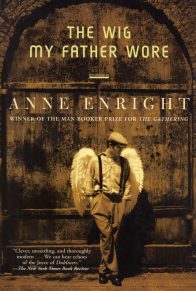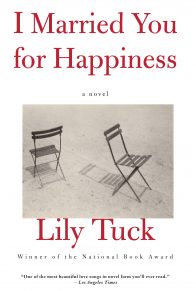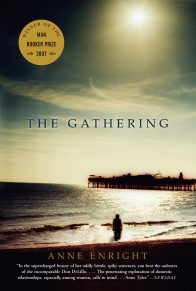Francisco Solano López put his penis inside Eliza Lynch on a lovely spring day in Paris, in 1854. They were in a house on the rue St-Sulpice; an ancient street, down which people have always strolled in a state of pleasant imagining. In the spring of 1854, no imagination was needed as Francisco Solano López pushed his penis into Eliza Lynch and pulled it back again, twenty times in all. This was quite a lot of times for Francisco Solano López , but something about Eliza Lynch distracted him from the usual rush of his pleasure. Something about Eliza Lynch gave him pause.
Outside, the birds sang, trees rustled and fancy carriages rattled by. Inside, the four-poster bed was hung with turquoise, its enormous baldaquin billowing above them and gathered into a pucker of silk that mirrored, as she lay under it, the lovely navel of Eliza Lynch.
Apart from the magnificent bed, she had nothing.
There was a burled walnut box pushed into a corner, an ormolu clock ticked on a mantel of ordinary stone, a simple table of inlaid tulipwood was burdened by a statue of the flagellated Christ. The room was practically bare, if you did not count the bed. But the bed was overwhelming, it was a room within the room; it was a palace, across whose yielding floor López crawled, laughing, in order to engage more thoroughly with the laughing Eliza Lynch.
Which, without further delay, he did.
Many people would come to regret this moment. You might say that everyone came to regret it—except for the two participants, Francisco López and Eliza Lynch, Il Mariscal and La Lincha, Paco and Liz. Already unreal. They were the kind of people who attracted stories—not to mention bias, rumours, lies, rage: the whole tangle pulled into a knot by time, made Gordian by history. The details cannot be unpicked. But this much we may not doubt: there was a joining of parts, and it happened in spring, on the rue St-Sulpice.
Paco and Liz, laughing on the bed. Mme Lynch silently looking at the silently looking Señor López. The tart from County Cork turning towards the turquoise, as the little mestizo handles it into her. It was a moment that garnered the blame of nations, as if everything started here. Something did start here—there are such things as beginnings—but what? But what?
They became lovers. In jig time, in marching time, in twenty beats, they moved from strangers to the rest of their lives. And they knew it. Such luck!
Outside, the birds chirped themselves to sleep, while his hired horse blew into his oats and the coachman snored. The clock on the mantel said midnight, or five o’clock. The clock on the mantel was stopped. And all you could hear was the suck and pull of his breath.
Who was he? He was heir apparent to Paraguay, a country that no one had ever heard of. Who was Eliza? She was very much herself. He had come to her house in order to improve his French, or so he said. The words he learned that evening were “King of Diamonds,” “Queen of Spades,” “trick.” He learned the French for sons of bitches, then truffles, pig’s nose, and tongue. Also a phrase: “If I win, you will not like me.” After which pleasant nonsense, they went to bed.
Oh Eliza. In fact, she did speak many languages: she romped in French, married in English, and she ate in the Irish of her childhood kitchen. She had school Latin and spa German, but her fate, now, was in Spanish, and she would die in Guaraña, which is to say, obscurely. The lover in her head spoke Russian, in whispers. The devil in her head spoke Portuguese.
And so, Francisco put his penis, son peñis, su penis, into the nameless part of Eliza Lynch. He put that thing, which is the same in English, French or Spanish, into a part of Eliza Lynch that is, in any language, obscene.
One:
He was rich. Two:
He was immensely rich.
He had ordered, that day, seventy pairs of silver-tipped boots—with presumably elevated insoles; because he was small, there was no gainsaying the fact that he was really quite small, but he was stunningly rich, so she, spilled out beneath him, must be magnificent.
Three:
She was silent.
It would not do to shout. Whatever surprise she felt at this, most surprising, intrusion must register as a mere stretch of her eyebrows, a fullness of her jostled mouth; her forehead suffused with a kind of puzzled tranquillity, as though the question—whatever question it might be—answered itself.
Four:
There was no telling how long he would take.
His hair smelt of lilacs and horses. His breath smelt of decay. His shirt was pulled impatiently open at the neck and a filthy leather pouch dabbed at her chest. Money? No—his money was folded and stuffed down the side of his boots. Vast sums. There was a flurry of paper when he dumped them, all unheeding, on the floor. Then his short military jacket; crusted with gold braid and held to lopsided attention by the remarkable epaulettes. After which his pants. His legs very thick and gnarled. His shirt dangling down.
She was wearing her sapphires. Also a peignoir of shrugged-off silk. It flowed down her arms and moved under her, like water.
Five:
Her lips jolted apart.
She must be his first woman in weeks. In Paris the whores would laugh at him, of course—that is why they were paid so much. Cora Pearl with her whip. Or Dolores at the Café Anglais with her diamonds and a bloody cough. Because they were all dying. Death in the bedroom and death again at the card table, where they would take his money, trick after trick. Here is the fool in from the colonies, let me introduce you to . . . M. le Duc de something he would not catch. Some ghoul of a German banker. A tart with diamonds in her hair, sitting in to watch. And if he tried to touch her, she would laugh in his face. The game continuing in silence. The stakes going up and up. The tart not laughing, any more. Up, and up and up.
He reared away from her.
She might bite him. She might tear at his bottom lip, if it were not for the terrible breath. When he walked into her drawing room, you could smell it from the doorway. No idea of where to sit or how to stand, until she took his hat in her own hands and said, quite natural-like, that he must leave it beside him here on the floor. This was what they did in Paris, she said to him, these strange Frenchmen, they left their hats on the floor so everyone could see their names in gilt letters written on the band—she spent her first weeks in town convinced that everyone was called Ruget, which was the name of the hatter. She laughed. Tra la la. Then she paused, rising in a rustle of silk, as though arrested, briefly, by the sight of his lap.
Easy.
She pulled the shirt, with rough fingers, up the length of his back.
Seven:
She arched her own back and said, “Oh.”
Everyone must take a lover, so they would know how to sigh and when to turn. It was an investment. Everyone should love once; there was no other way to learn. Eliza had wanted to love sweetly, hopelessly, but she loved like bad weather. And she only loved once. There was no use closing your eyes and thinking it was him. There was no use closing your eyes and thinking. But she did close her eyes, and saw López’s head briefly above her, his eyes red coals, his brain molten, his hair black flames. She opened them again, quickly, and was relieved to see flesh. Only flesh. Francine, outside, forgetting to bank the fire for the morning, as she always did.
Eight:
Who was counting?
She was counting. The first man in Paris, the second man in Paris, two men in Algeria, a man in Folkestone, Kent. Outside, Francine was clearing away the card table as, above her, López held his breath. Silence. The clock on the mantel had stopped. She counted them out to herself. The man who gave her the sapphires, the man who gave her the bed. Two men in Algeria, a man in Folkestone, Kent. Their memories rising now, as a scent might rise when you crush a flower. Each time he drew back, a name provoked—Raspail, Quatrefages, Misha, Bennett—and then hammered home.
Nine:
“If I win,” she said. “You will not like me.”
He spread his cards down on the table and looked at her. A good hand. A very good hand. He took the ace of hearts and started to cut out the centre of it with his little knife.
“I have kissed the hand of the Empress Eugénie,” he said. He described the ring she wore—a sapphire set with diamonds in a fleur-de-lis, over more diamonds and a pearl.
The Emperor Napoleon had pinned a ribbon on his breast. He put his arm about his shoulders and walked him personally to the door. Along the enfilade, thirty footmen pretended not to notice the fraternal kiss, man to man, soldier to soldier, nation to nation, as he took his leave.
Then he threw the empty-hearted card at her, across the baize.
This was a man who needed nothing.
This was a man who needed it all—but he did not need any one thing, except, and absolutely, to be inside her. As he now was.
Ten:
The dressmaker on Rue de Rougemont. Short and quick like a jockey, with burning, slithery eyes. She might like him. In another life, she might quite take to him. He looked her over and the deal, he seemed to be saying, was either her or 20 per cent. So she settled on the spot—lay herself down amid the silks and stuffs; a spool of Bruges lace still grasped in her hand. The lace cost, in labour, a metre a week. She thought about this—about how long it would take some Flemish hag to finish a fancy cuff, an entire dress, and the thought of the hag made her want to cry. She looked at the side of his head and her hand tightened on the wooden spool. She saw his blood on the hammered silk; she saw black blood seeping into the bombazine. When they were done, she asked him about the dresses, and he—as open in his love of warp and weft as he was closed in love (a grunter, a face-puller)—took her round the room, and romanced her with cloth. Nankin, taffeta, piquée, foulard. And so she got, on tick, five of everything, morning, afternoon and evening. Her under-linen, she must supply herself. She owned nothing, not even the peignoir she lay down in. She was not yet nineteen and she lived like a countess—on credit.
The money! The money! It was running through her hands like water. She tried to catch it, hold it: clutched instead at his neck, or his throat, or his mouth.
Eleven:
His hair smelt of Lilac vegetal by Pinaud. His shirt smelt clean. She would be rich. She would have a caléche like Cora Pearl, the English tart who dyed her dog blue to match her dress. A man said that her pearls were fake—she broke the string and let them scatter. The pearls sloughed from the string with a pull of her hand, spitting out all over the floor. Who picked them up? The pearls bouncing into corners, rolling under tables and little love seats. What fine young man paused at the door and silently stayed behind, then dropped on to his knees and grubbed around on the Turkey carpet, picking them up? Eliza caught her breath. The blue dog, the cale`che upholstered in sky-blue kid. She would have to change the curtains now, on her fabulous bed, because blue was Cora Pearl. A starving man she saw once, his legs set wide, and his thing hanging down in the gap, lush and fat. Eliza cried out. She had tried to be good, had wanted to be good, but the curtains had cost her a month of fucking and they were far too blue, and the pearls were scattering and rolling all over the floor.
Twelve:
Oh. Her voice in the room. A shudder in the hanging meat of his face, his eyes behind their closed lids like he was trying to squeeze something delicate and large through a very small gap—but only if he could find it. It was in there somewhere, in the centre of his head, and she wanted to kiss him; help him gather it up. A man he saw once, dragged by a horse; the bones sticking out of his ruined back. The man looking at him as though bored by it all, he said. Then slightly distracted. Then dead.
She was writhing away from him now, her eyes fixed.













